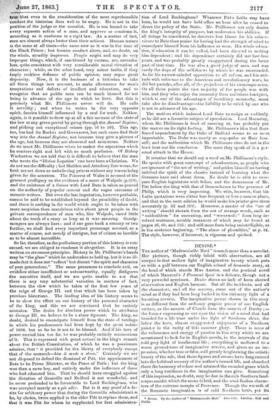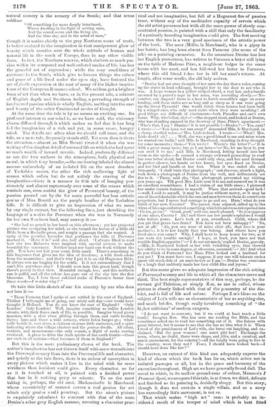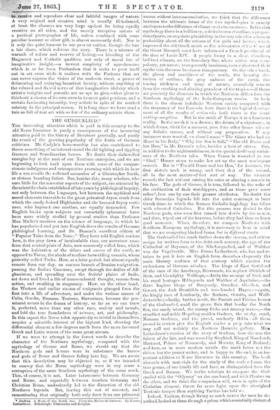DENISE.* THE author of "Mademoiselle Mori " is much more
than a novelist. Her pictures, though richly inlaid with observation, are all steeped in that mellow light of imaginative beauty which puts so wide a gulf between our English school of domestic story, at the head of which stands Miss Austen, and the poetical novel of which Mauzoni's 1 Promessi Sposi is a delicate, though not a very powerful specimen. Denise shows no lack of keen shrewd observation and English humour. But all the incidents, and all the characters, and all the scenery, come out of the author's mind as if they had been long bathed in the visionary light of a haunting reverie. The imaginative power shown in this story is as different from the ordinary graphic power of our English writers, as the sunsets of Claude from the sunsets of Danby ;- the former expressing to our eyes the vition of a mind that had brooded for a life.-time under the light of Southern skies, the latter the keen, almost exaggerated enjoyment of a Northern painter in the rarity of this summer glory. There is none of the vehemence and energy of passion in this story which we are accustomed to look for in English novels, in the intervals of the cold grey light of intellectual life ; everything is mellowed to a warm ground-tone of imaginative reverie, and gives us an im- pression, whether true or false, still greatly heightening the artistic beauty of the tale, that these figures and scenes have long entered into the habitual scenery of the author's inward life, and absorbed there the harmony of colour and attained the rounded grace which only a long residence in the imagination can give. Something of this impression, no doubt, may be due to the rich Southern land- scapes amidst which the scene is laid, and the semi-Italian charac- ters of the extreme margin of Provence. Though the warmth of the Romantic imagination is of cold Northern birth, yet its
• Denise. By the Author of " Mademoiselle Maxi." Two vols. London: Bell amid. Biddy.
natural scenery is the scenery of the South ; and that sense sublime
"Of something far more deeply interfused, Whose dwelling is the light of setting suns, And the round ocean and the living air, And the blue sky, and in the mind of man,"
though it is native chiefly to the grey Northern sense of truth, is better realized to the imagination in that omnipresent glow of beauty which mantles over the whole attitude of human and natural life in the south of Europe, than in any other visible form. In fart, the Northern reserve, which shelters so much pas- sion within its composed and well-ordered modes of life, has lost the graceful art of expression ; while the easy conditions of existence in the South, which give to human things the colour and grace of a life lived under the open sky, have fostered the art of facile expression at the cost of many of the higher inspira- tions of the European Romance school. We seldom get a brighter form of art than when we have, as in the present tale, a mixture of English depth and Southern feeling, a pervading strength of intellectual passion which is wholly English, melting into the ease and beauty of the softer Continental modes of thought.
At the same time the tale is by no means an exciting one. Its profound interest to our mind is, as we have said, the visionary charm diffused through it which makes us feel that it has long fod the iinagination of a rich and yet, in some sense, hungry mind. The details are often what we should call tame, and the tale, as a mere tale, frequently stands still. Yet even then it rivets the attention,—almost as Miss Bronte riveted it when she was writing of the simplest detail of outward life on which she had spent so much wealth of inward reverie. Indeed, profoundly different as are the two authors in the atmosphere, both physical and moral, in which they breathe,—the one having inhaled the almost morose melancholy of an isolated life on the most desolate of Yorkshire moors, the other the rich mellowing light of scenes which soften but do not satisfy the craving of the imagination—there is a manner in this tale of hanging pas- sionately and almost rapturously over some of the scenes which reminds one, even amidst the glow of Provencal beauty, of the passion poured out by the far more powerful but less artistic genus of Miss Brontli on the purple heather of the Yorkshire fells. It is difficult to give an impression of what we mean by any single extract, but the following lines, just sketching the longings of a native for Provence when she was in Normandy for her own Southern land, may convey it :—
"She had no pencil in her hand on this afternoon ; yet her projected picture was occupying her mind, as she turned the leaves of a little old Bible from a Rochelle press, and sought a passage that she wanted. A sprig of the peculiar lavender that perfumes the hills of Provence marked it. 'Here it is !' said she, half aloud. I always liked to read how the two Hebrews were inspired with special powers to make beautiful the sanctuary. Neither head nor hand can work without the gift. You have not lost your scent, little mark. There's something in this fragrance that gives me the idea of freedom; a wild fresh odour from the mountains ; and that's why I put it in an old Huguenot Bible. It always sets me longing for the south. Is it not extraordinary that I can't live anywhere else ? I should soon hate this green land, though there's poetry in that view. Mournful enough, too ; and this northern sun is pallid, and all the colour has gene out of the sky into the flax blossoms. Yes, I love those calcined rocks of Provence better than these woods—I wonder why ?' "
Or take this little sketch of our fen country by one who does not love it
:- "These Farnoux that I spoke of are settled in the east of England. Thither I bethought me of going, one misty soft day—one would have thought it Holland. You do not know the east of England ? 'Only London.' Only London ! Well, imagine something as unlike London streets, with their fierce rush of life, as possible. Imagine broad green marshes, with a slow river gliding through them, and cattle feeding there ; here and there a wide estuary, where laden barges go ; wind- mills beside it, vast trees, a château on some little eminence, and a spire indicating where the village clusters and the pasteur dwells. All silent, verdant, and monotonous—the only sounds, a flight of rooks cawing overhead. A place to drive the Arab spirits of the earth frantic—there are such in all nations—what becomes of them in England ?"
But this is the mere preliminary charm of the book. The author's imagination has not thrown itself with more warmth into the Provencal scenery than into the Provencal life and character, and quietly as the tale flows, there is an ardour of conception in every picture which makes it live in the mind with far more vividness than incident could give. Every character, so far as it is touched at all, is painted with a finished power that has in it nothing petty or minute. To us the most taking is, perhaps, the old aunt, Mademoiselle le Marchand, whose eccentricity of manner covers a real genius for art • which only genius could paurtray. But the niece's picture is exquisitely calculated to contrast with that of the aunt.
--- Denise's sober grey English manner, covering a character prac-
tical and not imaginative, but full of a Huguenot fire of passive trust, withont any of the meditative capacity of reverie which the old artist possesses but with all the more power of slowly con- centrated passion, is painted with a skill that only the familiarity of a patiently brooding imagination could give. The first meeting between the two is a very good specimen of the artistic power of the book. The aunt (Mdlle. he Marchand), who is a gipsy in her habits, has long been absent from Famous (the scene of the tale) on a painting excursion. In the meantime Denise has lost her English protectress, has written to Farnoux a letter still lying on the table of Madame Pitre, a neighbour lodger in the same house with her aunt, and has followed her letter to Famous, where this old friend tikes her in till her aunt's return. At length, after some weeks, the old lady arrives.
"Denise had not once thought of her aunt the day that a voice, coming up the stairs in loud soliloquy, brought her to the door to see who it was. A large woman in a yellow striped shawl, a vast hat, and a bundle crowned by a parrot's cage in her arms, was ascending slowly.—' No- vember, say August ! there is a heat to hatch crocodile's eggs on every landing, and these stairs are as long and as steep as if one were going- up the Great Pyramid! One would think these houses had been built by a winged race' who only used stairs when they were moulting ! all good things are difficult of attainment—both Paradise and one's own home. Why, who's that, eh ?—'—She stopped short, and looked at Denise, who was standing amazed in the doorway of Mme. Pitre's apartment.— ' Who's that, I say ? Diantre ! it is not possible !—Denise !'—' Yes, aunt I I wrote—'—' You have not run away?' demanded Mlle. he Marchand, in a sharp, startled voice.—' Mrs. Lisle is dead. I wrote—'—' What ! Mrs. Lisle dead ? ah ! . . . Well, she was a good friend to me and mine when we wanted one badly,' said Mlle. le Marchand, standing in deep thought for some moments ; then= You wrote? Where's the letter ?'—' It is with a great many more, but as I am here—'—' No, let me hear it, you can read it to me,' said Mlle. le Marchand, letting herself into her room as she spoke.—It seemed a strange awkward proceeding to read her own letter aloud, but Denise could only obey, and her aunt listened in perfect silence, her hands on her knees, her eyes fixed on Denise, and her bird and bundle at her feet. When it was ended she said brusquely, I shall burn that photograph ; ' and she rose, struck a light, took down a photograph of Denise from the wall, and deliberately set fire to it.There ' said she, that photograph prevented my visiting you years ago. Till good Mrs. Lisle sent it to me and assured me it was an excellent resemblance, I had a vision of my little niece ; I pictured her under certain features to myself. When that arrived—good lack ! —well, I said to myself, it may be justice without mercy, or it may be one of those falsehoods which the sun and men between them do contrive to perpetrate, but I never had courage to go and see. Hum ! what do you think of her now, Cocotte?' The parrot, thus adjured, sidled up to the wires of his cage and uttered something, which hismistress interpreted into Ca ira, fa ira! " Good, good,' said she, much pleased. So you approve of our niece, Cocotte ? Ah ! and there are few people's opinions I would take before yours. Let's look at you, sweetheart. Child, where did you get that grave face from ? You have not been unhappy ? "No, not at -all.' 'Ali, you are none of mine after all; that face is your mother's; it is to her family that you belong. And where have you lived since you came ? Why, I shall have to keep house for two, as if one were not trouble enough ! I hope, at least, you have not that terrible English appetite I do not eat much,' replied Denise, gravely. —Mlle. le Marchand looked at her with twinkling eyes, that showed her oddity to be in some degree, at all events, assumed.'—' Ah ! And what do you think of Farnoux? has Mine. Pitre looked out a husband for you yet ? You must have one, I suppose, if any one will tolerate such a queer old stock-fish of an aunt-in-law as I am.'— Denise was overcome by a laugh that suddenly made her face child-like and joyous."
Bat this scene gives no adequate impression of the rich setting of Provencal scenery and life in which all the characters move and think. The best single representative of this may, perhaps, be the servant girl Therezon, or simply Zon, as she is called, whose picture is closely linked with that of the peasantry of the dis- trict, and is full of life and colour. Perhaps Zen's ideas on the subject of Lot's wife are as characteristic of her as anything else, and much briefer, though really involving something of "the hilier criticism' of modern exegesis.
"I do not want to convert; but if we could at least teach a little truth! Imagine Zon. She has seen me reading the Bible, and has sometimes asked me to read her something out of it. She listens with great interest, but it seems to me that she has no idea what it is. When I read of the punishment of Lot's wife, she burst out laughing, and ex- claimed, But the poor woman ! one must pity her! Exchange the town, where, no doubt, there were shops, and fifes, and a carnival, and much amusement, for the country !—all the family were going to live in the country, were they not ? Tenez, I should have looked back—I should have done like her!"
However, no extract of this kind can adequately express the kind of charm which the book has for us, which arises not in isolated passages at all, but in the grace and harmony of the execution throughout. High art we have generally found dull. The novel to which, in its mellow ground-tone of colour, Manzoni's I Promessi Sposi, we compared this tale, is at times, we think, delicate and finished as its painting is, decidedly sleepy. But this story, though it does not contain a single villain, and as a stoiy has exceedingly little movement, is not so.
That which makes "high art" tame is probably an in- cidental result of the temper of mind which is best fitted to receive and reproduce clear mid faithful images of nature. A very original and creative mind is usually ill-balanced, at least the chances are very large against its being equally creative on all sides, and the merely receptive nature of a poetical photographer of life, unless combined with some peculiar humour or other gift, is almost necessarily dull. Nor is it only the quiet humour in our present author, though she has a fair share, which enlivens the story. There is a mixture of warmth of colour and reserve of feeling,—a blending of the Huguenot and Catholic qualities, not only of moral but of imaginative insight,—a fervent simplicity of apprehension which is so far from Puritanism that it seeks to pour itself out in art even while it realizes with the Puritans that art can never express the vision of the soul—in eliort, a power of delineating and enjoying luxuriant beauty, without anything of the relaxed and flaccid nerve of that imaginative idolatry which artistic insights and pursuits are so apt to give,—that gives to this book a charm of its own even in its most quiet portions, and a certain fascinating intensity, very artistic in spite of its marked sobriety in the principal sceues. It is long since we have read a tale so full of real art with so few of the ordinary artistic vices.
































 Previous page
Previous page